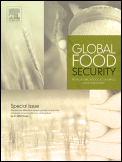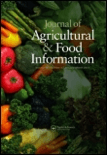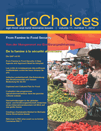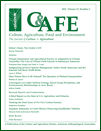
Global Food Security-Agriculture Policy Economics and Environment
Scope & Guideline
Transforming agricultural policy for a resilient future.
Introduction
Aims and Scopes
- Food Security Assessment and Policy Analysis:
The journal emphasizes rigorous assessments of food security at both global and local levels, exploring the effectiveness of various agricultural policies and interventions aimed at improving food access and nutritional outcomes. - Sustainable Agricultural Practices:
Research published in the journal frequently investigates sustainable agricultural methods, innovations, and technologies that enhance productivity while minimizing environmental impacts, aiming for resilience in food systems. - Socio-Economic and Cultural Dimensions of Food Security:
The journal highlights the importance of socio-economic factors and cultural contexts in shaping food security, exploring issues such as gender roles, migration, and the influence of local traditions on food consumption patterns. - Climate Change and Food Systems:
A significant focus is placed on the intersection of climate change and food security, examining how environmental changes affect agricultural productivity, food supply chains, and the resilience of communities. - Health and Nutrition Linkages:
The journal integrates research on nutrition and health, emphasizing the connections between dietary diversity, food environments, and overall public health outcomes.
Trending and Emerging
- Impact of Climate Change on Food Systems:
Recent papers emphasize the urgent need to address climate change's impact on food systems, focusing on adaptation strategies and resilience-building measures for communities vulnerable to environmental shocks. - Interdisciplinary Approaches to Food Security:
There is a growing trend towards interdisciplinary research that integrates insights from agriculture, economics, public health, and environmental science, fostering comprehensive solutions to food insecurity. - Gender and Food Systems:
Emerging themes increasingly address gender dynamics in food systems, exploring women's roles in agriculture, food security, and the importance of gender-responsive policies to enhance resilience. - Urban Food Security and Governance:
Recent publications highlight the complexities of urban food systems, focusing on governance, policy frameworks, and the role of urban agriculture in enhancing food security in cities. - Digital Innovations in Agriculture:
The integration of digital technologies in agriculture is gaining traction, with research exploring how innovations can improve food production, market access, and resilience against shocks.
Declining or Waning
- Traditional Agricultural Practices:
Research focusing solely on conventional farming techniques has decreased, as there is a growing emphasis on sustainable and innovative practices that address contemporary challenges such as climate change and food insecurity. - Static Food Security Models:
There is a noticeable decline in publications utilizing static models of food security, as researchers increasingly adopt dynamic, systems-based approaches that account for complex interactions within food systems. - Limited Geographical Focus:
Studies that concentrate on isolated geographical regions without considering broader global linkages are becoming less frequent, reflecting a shift towards more integrated analyses that consider global food systems and trade dynamics. - Generalized Food Security Indicators:
The use of broad, generalized indicators for food security assessment is waning, giving way to more nuanced, context-specific measures that reflect local conditions and challenges. - Focus on Food Production Alone:
There is a diminishing emphasis on food production metrics without consideration of consumption patterns, dietary diversity, and socio-economic factors affecting food security.
Similar Journals

Nutrition Journal
Advancing the Science of Nutrition for a Healthier Tomorrow.Nutrition Journal is a prestigious open-access publication from BMC, dedicated to advancing the field of nutrition and dietetics since its inception in 2002. With an impressive impact factor and a notable Scopus ranking, it ranks in the top quartile (Q1) in both Medicine (miscellaneous) and Nutrition and Dietetics, highlighting its significant contribution to health sciences. Based in the United Kingdom, the journal covers a broad spectrum of topics, making it an essential resource for researchers, healthcare professionals, and students interested in nutrition's role in health and disease prevention. The journal not only facilitates the dissemination of groundbreaking research but also prioritizes accessibility, allowing global audiences to engage with vital findings that shape dietary practices and public health policies. With a commitment to interdisciplinary collaboration, Nutrition Journal fosters an environment where innovative ideas and evidence-based solutions can flourish, making it a cornerstone reference in the field.

AIMS Agriculture and Food
Innovating solutions for modern agricultural challenges.AIMS Agriculture and Food is a leading open access journal published by the American Institute of Mathematical Sciences (AIMS), focused on the critical intersections of agricultural and food sciences. Since its inception in 2016, this journal has provided a vital platform for disseminating innovative research and advancements in the fields of agricultural and biological sciences and food science. With impressive Scopus rankings, including a Q2 categorization in 2023 for both Agricultural and Biological Sciences (miscellaneous) and Food Science, AIMS Agriculture and Food is recognized for its significant contributions to the academic community. The journal aims to foster interdisciplinary dialogue by welcoming submissions that tackle contemporary challenges, promote sustainable practices, and enhance food security. Researchers, professionals, and students will find this journal an invaluable resource, offering open access to high-quality, peer-reviewed articles that are essential for informed decision-making in agriculture and food industries.

Future of Food-Journal on Food Agriculture and Society
Innovating Solutions for Global Food ChallengesThe Future of Food-Journal on Food Agriculture and Society, published by Kassel University Press GmbH, serves as a vital platform for emerging research at the intersection of food, agriculture, and societal impacts. With an ISSN of 2197-411X and operating within the realms of Agronomy, Ecology, and Food Science, this journal is pivotal for researchers and professionals aiming to address contemporary challenges in the food sector. Although currently ranked in the fourth quartile across its scholarly categories (2023), the journal showcases a wealth of innovative studies, critical analyses, and global perspectives that strive to enhance our understanding of sustainable agriculture practices, food security, and environmental stewardship. The Open Access format encourages wide dissemination and engagement with research findings, making it an essential resource for students and academics alike. As the journal converges from 2013 to 2024, it aims to foster discussions that will shape the future of food systems worldwide.

Nature Food
Exploring the Intersection of Agronomy and Culinary Science.Nature Food, an esteemed journal published by NATURE PORTFOLIO, stands at the forefront of research in Agronomy, Animal Science, and Food Science. With its E-ISSN 2662-1355 and a remarkable recognition of being ranked Q1 in three essential categories by Scopus in 2023, it is tailored for researchers, professionals, and students dedicated to the advancement of knowledge in these fields. Situated in the United Kingdom and extending its reach globally, the journal has displayed an impressive ranking, placing it in the top percentiles of Agricultural and Biological Sciences, highlighting its vital place in fostering innovative research and scholarly communication. The journal's scope encompasses a wide array of topics critical to food systems, sustainability, and agricultural practices, making it an invaluable resource for anyone looking to stay ahead in this dynamic area of study. With access options designed to enhance the visibility and dissemination of research findings, Nature Food is committed to promoting open dialogue and collaboration among the global academic community, driving forward our understanding of food security and environmental stewardship.

Studies in Agricultural Economics
Pioneering Research for Rural Development SolutionsStudies in Agricultural Economics is a premier journal published by AGRARGAZDASAGI KUTATO & INFORMATIKAI INTEZET in Hungary, focusing on innovative research in the interdisciplinary fields of agricultural, biological, and economic sciences. Since becoming an Open Access journal in 1997, it has aimed to enhance the visibility of agricultural economics scholarship while promoting global engagement among researchers, practitioners, and policymakers. With its robust Q2 and Q3 rankings across varied categories including Development and Geography, this journal serves as a significant platform for disseminating cutting-edge studies that address crucial issues in agriculture and rural development. The journal's continuous publication since 2011 until 2024 exemplifies its commitment to providing timely insights into evolving agricultural challenges. With a strong Scopus ranking across multiple domains, particularly in the social sciences and agricultural sectors, it stands as a vital resource for anyone looking to advance knowledge and practice in these critical areas.

JOURNAL OF AGRICULTURAL ECONOMICS
Pioneering research for a sustainable agricultural economy.JOURNAL OF AGRICULTURAL ECONOMICS, published by Wiley, is a leading scholarly journal dedicated to the field of agricultural economics. Since its inception in 1928, the journal has provided a platform for rigorous research, offering insights and analysis on the economic aspects of agriculture, food production, and rural development. With an impressive impact factor and ranked in the Q1 category in both Agricultural and Biological Sciences as well as Economics and Econometrics, it stands among the top-tier publications in its field. The journal's ISSN is 0021-857X, and it also has an E-ISSN of 1477-9552. Researchers, professionals, and students seeking to enhance their understanding of agricultural economic policies and practices will find invaluable resources, empirical studies, and theoretical discussions within its pages. The JOURNAL OF AGRICULTURAL ECONOMICS remains an essential conduit for advancing knowledge and shaping discussions that matter in the global agricultural economy.

African Journal of Agricultural and Resource Economics-AFJARE
Empowering research, transforming resources.African Journal of Agricultural and Resource Economics (AFJARE) is a dynamic publication dedicated to advancing the fields of agricultural and resource economics within the context of Africa. Published by the African Association of Agricultural Economists, this journal serves as a vital platform for researchers, professionals, and students to disseminate their findings and engage with contemporary issues affecting the agricultural sector across the continent. With an ISSN of 1993-3738 and an E-ISSN of 1993-3738, AFJARE aims to reach a wide audience through its commitment to open access, ensuring that crucial research is accessible to all. The journal has recently established itself in the academic landscape, achieving a Q3 ranking in Agricultural and Biological Sciences and a Q4 ranking in Economics and Econometrics for 2023. Covering a diverse scope from 2018 to 2023, AFJARE encourages submissions that explore innovative economic strategies and policies that can foster agricultural development and resource management in Africa. With its growing impact and relevance, AFJARE is poised to become a cornerstone in the discourse on agricultural economics in Africa and beyond.

Journal of Agricultural & Food Information
Transforming Research into Actionable Food Solutions.Welcome to the Journal of Agricultural & Food Information, a pivotal platform for disseminating research and insights across the domains of agronomy, food science, and information systems management. Published by Routledge Journals, Taylor & Francis Ltd, this esteemed journal, with an ISSN of 1049-6505 and E-ISSN 1540-4722, plays a crucial role in bridging the gap between innovative agricultural practices and food information systems. Despite its current categorization in the Q4 quartile across relevant fields, it remains committed to fostering scholarly dialogue and encouraging interdisciplinary collaboration. With a history of publication spanning multiple converged years from 1993 to 2024, the journal is dedicated to publishing high-quality, peer-reviewed articles that address the challenges and advancements in agricultural and food information. Currently not available as Open Access, this journal provides valuable insights for researchers, professionals, and students who are eager to harness information for the progress of food security and sustainable agricultural practices. Join the conversation in enhancing our understanding and application of vital agricultural and food-related information.

EuroChoices
Elevating research standards in economics and geography.EuroChoices, published by WILEY, is a leading journal in the fields of economics and geography, demonstrating a significant impact as evidenced by its exceptional rankings—Q1 in both Economics, Econometrics and Finance and Geography, Planning and Development for 2023. With an ISSN of 1478-0917 and an E-ISSN of 1746-692X, this esteemed journal has been a pivotal platform for scholarly discourse since its inception in 2003, evolving thoughtfully to encompass contemporary issues and trends through 2024. Situated in the United States, it serves as an essential resource for researchers, professionals, and students alike, offering insights that bridge economic theories with geographical perspectives. While it maintains a traditional publishing approach without open access options, the journal continues to thrive, achieving high ranks in Scopus—with Economics positioned 37th out of 242 and Geography at 151st out of 821—highlighting its role as a critical contributor to the academic community.

Culture Agriculture Food and Environment
Exploring the Intersections of Culture, Agriculture, and SustainabilityCulture Agriculture Food and Environment, published by WILEY, is an esteemed journal that serves as a pivotal platform for interdisciplinary research at the intersection of cultural studies, anthropology, and agricultural sciences. With its ISSN 2153-9553 and E-ISSN 2153-9561, this journal aims to foster scholarly dialogue on the complex relationships between food, culture, and environmental sustainability. As of 2023, it proudly holds a Q2 ranking in Agricultural and Biological Sciences and Anthropology, as well as a Q1 ranking in Cultural Studies, indicating its significant impact within these disciplines. Researchers and professionals will appreciate its rigorous peer-review process and diverse coverage, which extends from 2011 to 2024, reflecting ongoing debates and innovations in the field. Although open access options are not provided, the journal's commitment to advancing knowledge in understanding food systems and cultural practices makes it a vital resource for academics and practitioners alike, promoting a deeper understanding of the cultural dimensions of agriculture and the environment.